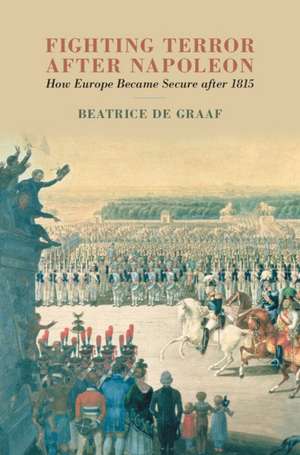Fighting Terror after Napoleon: How Europe Became Secure after 1815
Autor Beatrice de Graafen Limba Engleză Hardback – 30 sep 2020
Preț: 278.52 lei
Nou
Puncte Express: 418
Preț estimativ în valută:
53.30€ • 55.72$ • 45.04£
53.30€ • 55.72$ • 45.04£
Carte disponibilă
Livrare economică 13-27 februarie
Livrare express 29 ianuarie-04 februarie pentru 50.10 lei
Preluare comenzi: 021 569.72.76
Specificații
ISBN-13: 9781108842068
ISBN-10: 1108842062
Pagini: 518
Dimensiuni: 158 x 235 x 29 mm
Greutate: 0.91 kg
Editura: Cambridge University Press
Colecția Cambridge University Press
Locul publicării:Cambridge, United Kingdom
ISBN-10: 1108842062
Pagini: 518
Dimensiuni: 158 x 235 x 29 mm
Greutate: 0.91 kg
Editura: Cambridge University Press
Colecția Cambridge University Press
Locul publicării:Cambridge, United Kingdom
Cuprins
Prologue, 1. Introduction: Napoleon's frustration; 2. Providence in Paris; 3. Balancing in a climate of distress; 4. 'A moderate occupation'; 5. 'Fausses nouvelles' and 'Black lists': the Allied struggle against 'armed Jacobinism'; 6. Fighting 'terroristes' together: towards a 'European police directorate'?; 7. The price of security; 8. Fortress Europe: constructing the 'Wellington barrier'; 9. Beyond Europe; 10. Conclusion; Bibliography.
Recenzii
'Beatrice de Graaf provides a deep and brilliantly original history of the idea of Europe, not as an imagined essence, but as a dynamic co-operative platform, a trans-national way of legitimating authority and action. Compellingly argued, elegantly written and rich in arresting episodes, Fighting Terror after Napoleon is a stimulating and provocative re-reading of early nineteenth-century Europe.' Sir Christopher Clark, author of The Sleepwalkers: How Europe Went to War in 1914
'International history at its best. Analysing the Vienna system after 1815 as a security culture, the book not only unfolds a stimulating new view on post-Napoleonic Europe, but also demonstrates the enormous potential of historical security research.' Eckart Conze, co-editor of Nuclear Threats, Nuclear Fear, and the Cold War of the 1980s
'A celebrity scholar of terrorism in the Netherlands, the indomitable Beatrice de Graaf now delivers us a new history of terror and security. Fighting Terror after Napoleon makes the nineteenth century matter again, as a way of understanding our present, not only the international order we are on the verge of losing, but its wildest realistic ambitions.' Glenda Sluga, author of Internationalism in the Age of Nationalism
'An absorbing and insightful account of the Allied occupation of France after Waterloo that shows how its mechanisms served as the keystone for the broader efforts to maintain peace and security after the French Revolution and Napoleon, across Europe and beyond.' Brian Vick, author of The Congress of Vienna: Power and Politics after Napoleon
'This analytically sharp, deeply historical work makes clear just how entangled and enfolded our disciplines are becoming, conceptually and empirically. As such, de Graaf's book potentially marks a step change in the quality and depth of conversation between the disciplines. It is thus a remarkable achievement, not only of history but of inter-disciplinarity.' Jennifer Mitzen, H-Diplo
'Impressively researched, carefully conceptualized, and creatively narrated, de Graaf 's study reminds us of how our modern understanding of and approach to 'security,' both military and political, is a product of the post-Napoleonic age.' Christine Haynes, Journal of Military History
'In Fighting Terror after Napoleon, de Graaf (Utrecht Univ., the Netherlands) analyzes how the UK, Russia, Austria, and Prussia cooperated through the Allied Council of the Quadruple Alliance to create a European-wide system of security to maintain peace and fight against terror after Napoleon's final defeat. Her detailed and lively account, which is based on extensive use of archival sources from across Europe, will stimulate scholarly debates regarding the characteristics of the post-Napoleonic settlement as well as the nature of 19th-century diplomacy.' M. E. Ailes, Choice
'International history at its best. Analysing the Vienna system after 1815 as a security culture, the book not only unfolds a stimulating new view on post-Napoleonic Europe, but also demonstrates the enormous potential of historical security research.' Eckart Conze, co-editor of Nuclear Threats, Nuclear Fear, and the Cold War of the 1980s
'A celebrity scholar of terrorism in the Netherlands, the indomitable Beatrice de Graaf now delivers us a new history of terror and security. Fighting Terror after Napoleon makes the nineteenth century matter again, as a way of understanding our present, not only the international order we are on the verge of losing, but its wildest realistic ambitions.' Glenda Sluga, author of Internationalism in the Age of Nationalism
'An absorbing and insightful account of the Allied occupation of France after Waterloo that shows how its mechanisms served as the keystone for the broader efforts to maintain peace and security after the French Revolution and Napoleon, across Europe and beyond.' Brian Vick, author of The Congress of Vienna: Power and Politics after Napoleon
'This analytically sharp, deeply historical work makes clear just how entangled and enfolded our disciplines are becoming, conceptually and empirically. As such, de Graaf's book potentially marks a step change in the quality and depth of conversation between the disciplines. It is thus a remarkable achievement, not only of history but of inter-disciplinarity.' Jennifer Mitzen, H-Diplo
'Impressively researched, carefully conceptualized, and creatively narrated, de Graaf 's study reminds us of how our modern understanding of and approach to 'security,' both military and political, is a product of the post-Napoleonic age.' Christine Haynes, Journal of Military History
'In Fighting Terror after Napoleon, de Graaf (Utrecht Univ., the Netherlands) analyzes how the UK, Russia, Austria, and Prussia cooperated through the Allied Council of the Quadruple Alliance to create a European-wide system of security to maintain peace and fight against terror after Napoleon's final defeat. Her detailed and lively account, which is based on extensive use of archival sources from across Europe, will stimulate scholarly debates regarding the characteristics of the post-Napoleonic settlement as well as the nature of 19th-century diplomacy.' M. E. Ailes, Choice
Notă biografică
Descriere
Europe was forged out of the ashes of the Napoleonic Wars by means of a collective fight against revolutionary terror.
